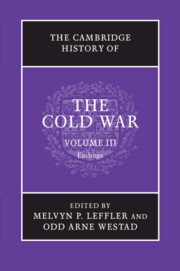Book contents
- Frontmatter
- 1 The Cold War and the intellectual history of the late twentieth century
- 2 The world economy and the Cold War, 1970–1990
- 3 The rise and fall of Eurocommunism
- 4 The Cold War and Jimmy Carter
- 5 Soviet foreign policy from détente to Gorbachev, 1975–1985
- 6 Islamism, the Iranian revolution, and the Soviet invasion of Afghanistan
- 7 The collapse of superpower détente, 1975–1980
- 8 Japan and the Cold War, 1960–1991
- 9 China and the Cold War after Mao
- 10 The Cold War in Central America, 1975–1991
- 11 The Cold War and southern Africa, 1976–1990
- 12 The Gorbachev revolution and the end of the Cold War
- 13 US foreign policy under Reagan and Bush
- 14 Western Europe and the end of the Cold War, 1979–1989
- 15 The East European revolutions of 1989
- 16 The unification of Germany, 1985–1991
- 17 The collapse of the Soviet Union, 1990–1991
- 18 Science, technology, and the Cold War
- 19 Transnational organizations and the Cold War
- 20 The biosphere and the Cold War
- 21 The Cold War and human rights
- 22 The Cold War in the longue durée: global migration, public health, and population control
- 23 Consumer capitalism and the end of the Cold War
- 24 An ‘incredibly swift transition’: reflections on the end of the Cold War
- 25 The restructuring of the international system after the Cold War
- Bibliographical essay
- Index
- References
13 - US foreign policy under Reagan and Bush
Published online by Cambridge University Press: 28 September 2010
- Frontmatter
- 1 The Cold War and the intellectual history of the late twentieth century
- 2 The world economy and the Cold War, 1970–1990
- 3 The rise and fall of Eurocommunism
- 4 The Cold War and Jimmy Carter
- 5 Soviet foreign policy from détente to Gorbachev, 1975–1985
- 6 Islamism, the Iranian revolution, and the Soviet invasion of Afghanistan
- 7 The collapse of superpower détente, 1975–1980
- 8 Japan and the Cold War, 1960–1991
- 9 China and the Cold War after Mao
- 10 The Cold War in Central America, 1975–1991
- 11 The Cold War and southern Africa, 1976–1990
- 12 The Gorbachev revolution and the end of the Cold War
- 13 US foreign policy under Reagan and Bush
- 14 Western Europe and the end of the Cold War, 1979–1989
- 15 The East European revolutions of 1989
- 16 The unification of Germany, 1985–1991
- 17 The collapse of the Soviet Union, 1990–1991
- 18 Science, technology, and the Cold War
- 19 Transnational organizations and the Cold War
- 20 The biosphere and the Cold War
- 21 The Cold War and human rights
- 22 The Cold War in the longue durée: global migration, public health, and population control
- 23 Consumer capitalism and the end of the Cold War
- 24 An ‘incredibly swift transition’: reflections on the end of the Cold War
- 25 The restructuring of the international system after the Cold War
- Bibliographical essay
- Index
- References
Summary
What role did President Ronald Reagan and President George H. W. Bush play in ending the Cold War? Three distinct schools of thought have arisen in response to this question. The first school maintains that the United States triumphed in the Cold War by destroying its nemesis, the USSR. These “triumphalists” focus primarily on the Reagan years and contend that the administration brought about the end of the Cold War by hastening (even causing) the collapse of the Soviet Union. In this view, the Reagan administration was keenly aware of the fragile state of the USSR. Thus, it adopted a hardline policy to push its enemy toward collapse. This policy included an unprecedented military buildup, the introduction of the Strategic Defense Initiative (SDI), and tough rhetoric. Ultimately, the Reagan administration proved victorious: the Soviets could not keep pace with the administration’s military expenditures, nor could they match US technological advances. Consequently, the Kremlin was forced to surrender. Mikhail Gorbachev, the Soviet leader, had no option other than to become more conciliatory toward Washington. The ultimate triumph came in 1991, however, when the Soviet Union ceased to exist.
A second school of thought turns this logic on its head. In this view, the Reagan administration’s hardline policies were an impediment to ending the Cold War. The president’s virulent anti-Communism, his belligerent rhetoric, SDI, and the military buildup combined to make it more difficult for Gorbachev to pursue improved relations with the West.
- Type
- Chapter
- Information
- The Cambridge History of the Cold War , pp. 267 - 288Publisher: Cambridge University PressPrint publication year: 2010
References
- 7
- Cited by

